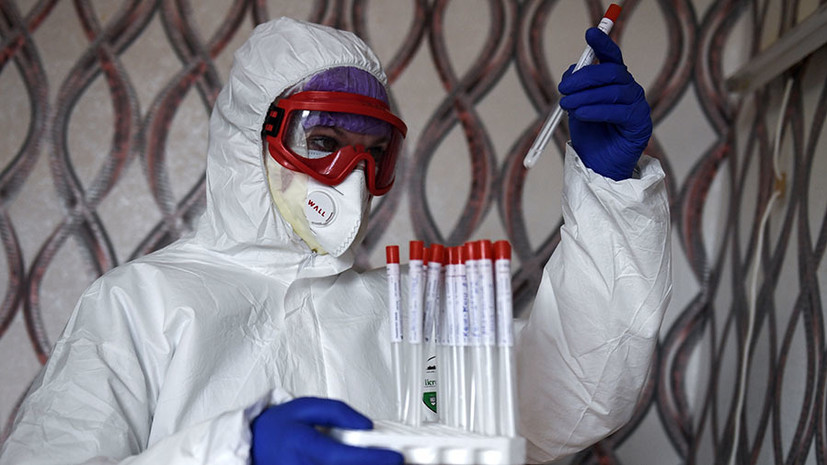In Russia, over the past day, 21 798 new cases of coronavirus infection were detected.
In the two days preceding this, COVID-19 was detected in 20,498 and 20,396 people.
During this time, 10,722 people were cured of the disease, 256 patients died.
For all the time in the country, according to the operational headquarters for combating the spread of infection, 1,796,132 cases of coronavirus (+ 1.2%) were recorded, 1,335,141 people (74.33%) recovered, 30,793 (1.71%) died from complications that developed against the background of coronavirus infection and concomitant diseases.
Most of the new cases of COVID-19 were recorded in Moscow (6897).
In St. Petersburg, 1403 new cases of infection were recorded, which is more than one and a half times more than a week ago.
High incidence rates were noted in Moscow (660), Nizhny Novgorod (411) and Arkhangelsk (342) regions.
At the same time, the lowest rate of increase in COVID-19 per day was noted in the Chukotka Autonomous Okrug (0%) and Dagestan (0.5%).
According to the headquarters, 1104 patients with coronavirus were hospitalized in Moscow per day.
There are 349 people on ventilators.
For the first time since the opening of the hospital for coronavirus patients in Kommunarka, 1,000 people are being treated at the institution, the head physician of the hospital Denis Protsenko said on Facebook.
“GKB # 40 (Kommunarka): 253 days of work as a covid center.
Today, for the first time since the opening of the emergency hospital, there is a four-digit number of patients.
1000 patients are being treated, 198 of them are in intensive care units, ”the doctor wrote.
According to Rospotrebnadzor, more than 65.2 million laboratory tests for coronavirus infection have been carried out in the country, including 526 thousand in the last day.
425.1 thousand people remain under medical supervision.
On the eve, representatives of the laboratories said that false test results for COVID-19 may be due to a number of errors of laboratory workers and the patients themselves.
As RBC writes with reference to representatives of institutions that conduct tests for coronavirus, the biomaterial is prescribed to be taken from the oropharynx and nasopharynx.
The physician should not touch the cheeks, tongue, gums, or lips with the stick directly when taking the test.
The sample is taken from the back of the throat.
The physician should collect cells from the top layer, not saliva.
After sampling, the top of the probe should be broken off by hand and not cut off with scissors, which may retain the virus.
If material is taken only from the oropharynx or from the nose, a false result is possible.
Along with this, before taking a sample, you must treat your gloved hands with an antiseptic.
Also, when taking a smear, the sterility of the probes and tubes where the sample is placed is important.
On the part of the patient, it may be a mistake to consume food or drinks before taking the material.
In addition, it is not recommended to brush your teeth, rinse your mouth, use chewing gum, smoke, rinse your nose, and instill medications before the test.
Cancer and Vitamin D Deficiency
Nikolai Zhukov, board member of the Russian Society of Clinical Oncology (RUSSCO), in an interview with RT, commented on the situation when a person with oncology becomes ill with coronavirus.
Any additional illness overlaid by the coronavirus could worsen, the expert said.
“If a person has any severe manifestations of an oncological disease, this does not mean that all cancer patients are at increased risk.
If a person who has a large tumor requires some kind of aggressive treatment with a large number of complications and COVID-19 is superimposed on it, then he will have a higher risk of a severe course, ”Zhukov told RT.
However, the doctor noted the low likelihood that coronavirus can cause cancer.
He noted that no mechanisms were described that could trigger the oncological process in connection with the virus.
“The answer to the question of whether this is actually so from a practical point of view will be clear, I think, in 10-15 years.
Usually, approximately this period passes from the moment of exposure to a carcinogen to the development of a tumor, ”Zhukov suggested.
British doctors, in turn, believe that a lack of vitamin D may be the cause of a more severe course of the coronavirus.
This is reported by the Express newspaper.
"Vitamin D deficiency is the dominant risk factor for severe coronavirus infection," said Dr. Garrett Davis.
He noted that a full year cycle is required for a full study, and the coronavirus epidemic began less than a year ago.
According to Davis, vitamin D is able to protect the body from the penetration of the coronavirus.

